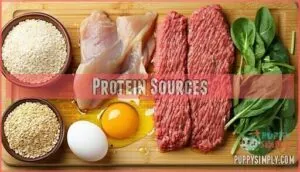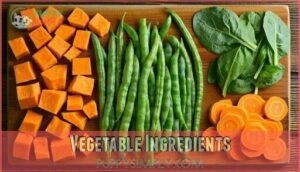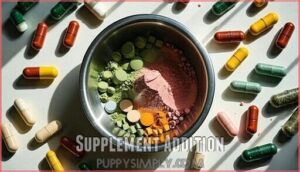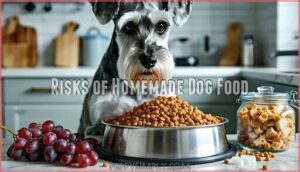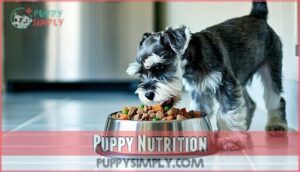This site is supported by our readers. We may earn a commission, at no cost to you, if you purchase through links.

Schnauzers need high-quality protein, healthy fats, and limited carbs to maintain their energy and coat.
Homemade meals let you control ingredients, avoid fillers, and address specific allergies that plague this breed.
Start with lean meats like chicken or turkey, add dog-safe vegetables like carrots and sweet potatoes, and include supplements for complete nutrition.
Watch portions carefully – schnauzers love food but gain weight easily.
While homemade food offers incredible benefits, there’s a right way and wrong way to do it safely and with complete nutrition.
Table Of Contents
- Key Takeaways
- Schnauzer Diet Requirements
- Homemade Dog Food Benefits
- Schnauzer Homemade Food Recipes
- Risks of Homemade Dog Food
- Feeding Schnauzer Puppies
- Frequently Asked Questions (FAQs)
- What is the best food to feed schnauzers?
- Can schnauzers eat cooked meat?
- What not to feed miniature schnauzer?
- Are there any specific vegetables that I should avoid feeding to my schnauzer?
- Are there any supplements that I should add to my schnauzer’s homemade dog food?
- Can schnauzers eat raw homemade dog food?
- How long does homemade schnauzer food last?
- What kitchen equipment is needed for preparation?
- Should senior schnauzers have different homemade recipes?
- Can homemade food help with schnauzer skin conditions?
- Conclusion
Key Takeaways
- Control every ingredient – You’ll eliminate fillers, preservatives, and mystery additives while addressing your schnauzer’s specific allergies and dietary needs.
- Balance nutrition carefully – Your homemade meals need 22-25% protein, 8-15% fat, plus essential supplements since 80% of homemade diets lack proper calcium-phosphorus ratios.
- Watch for serious risks – You’ll face potential bacterial contamination, nutritional deficiencies, and toxicity from oversupplementation without proper veterinary guidance.
- Start with a vet consultation – You’ll need professional advice to create balanced recipes, monitor your dog’s response, and adjust portions based on age, activity level, and health conditions.
Schnauzer Diet Requirements
Your Schnauzer’s diet needs careful attention to protein, fats, carbohydrates, vitamins, and minerals to support their active lifestyle and maintain that distinctive wiry coat.
Getting the right balance isn’t just about filling their bowl—it’s about understanding their specific calorie needs, creating a consistent feeding schedule, and watching for potential food allergies that can affect this intelligent breed.
Nutritional Needs
Your schnauzer’s body needs the right fuel to thrive. Think of macronutrient balance as the foundation—22-25% protein builds muscle, while 8-15% fat keeps their coat shiny.
Your schnauzer needs the right fuel to thrive with balanced nutrition and quality ingredients.
Homemade dog food lets you control quality, but canine nutrition requires precision to avoid deficiencies.
Essential nutritional components include:
- Protein from chicken, beef, or fish for muscle development
- Omega fatty acids for coat health and inflammation reduction
- Calcium-phosphorus ratio of 1.2:1 for strong bones
- B vitamins and zinc for immune system support
- Fresh water availability for proper hydration needs
Calorie Intake
Understanding your schnauzer’s calorie needs prevents both pudgy pups and skinny situations.
Adult schnauzers need 30-40 calories per pound daily, while active dogs require 20-30% more.
Activity levels, age factors, and weight management goals all influence portions.
Senior dogs need 15% fewer calories, puppies need double.
A key factor involves understanding dog feeding guidelines for proper health.
Your homemade dog food should account for treat calories too—they add up fast in any balanced dog diet plan!
Feeding Schedule
Once you’ve determined proper calorie intake, establishing a consistent meal frequency becomes your next priority.
Adult Schnauzers thrive on two meals daily, while puppies need three to four smaller portions.
Portion sizes should match your dog’s activity level – active Schnauzers require larger servings than couch potatoes.
Senior schedules often benefit from smaller, more frequent meals.
Your schnauzer diet plan works best when meals arrive at regular times, helping digestion and preventing overeating.
Food Allergies
When beef, dairy, or wheat trigger reactions, your schnauzer’s skin becomes their distress signal.
Your schnauzer’s skin tells the story when food fights back.
Common allergens affect 30% of these dogs, causing chronic itching and ear infections.
Elimination diets help pinpoint culprits with 89-96% accuracy, while allergy testing guides homemade schnauzer food choices.
Novel proteins like turkey provide itch relief for sensitive stomachs.
Homemade Dog Food Benefits
Making homemade dog food for your Schnauzer gives you complete control over what goes into their bowl, which can lead to better overall health and fewer digestive issues.
You’ll also save money in the long run while creating meals perfectly suited to your dog’s specific needs and preferences.
Improved Health
When you prepare homemade schnauzer food, you’re taking charge of your dog’s well-being.
Fresh ingredients boost digestive health and enhance coat quality naturally. Your schnauzer food recipe can include joint support elements like fish oil, while providing immune boost through real vegetables.
Quality dog nutrition helps with weight management too. Homemade schnauzer food gives you control over every ingredient, ensuring healthy dog food that supports your pup’s specific needs better than processed alternatives.
To aid in weight loss, consider calculating caloric needs for your schnauzer.
Reduced Allergies
Making your own schnauzer food recipe gives you complete control over what goes into your dog’s bowl.
When dog allergies strike, switching to natural dog food with limited ingredients can be a game-changer for your furry friend’s comfort.
- Ingredient Elimination: Remove common allergens like beef, chicken, or wheat systematically
- Allergy Testing: Monitor your schnauzer’s reaction to each new ingredient you introduce
- Skin Health: Watch for reduced scratching, hot spots, and irritated patches
- Immune Boosters: Add omega-3 rich ingredients that support overall wellness
Healthy dog food recipes let you pinpoint exactly what triggers your schnauzer’s reactions.
Customized Diet
You can tailor dog food recipes to match your Schnauzer’s specific needs perfectly.
Consider their life stage, activity level, and any health conditions when planning meals.
Active dogs need more protein, while senior pups benefit from joint-supporting ingredients.
You’ll address taste preferences too, creating recipes your dog actually enjoys eating, which can be tailored to their specific needs.
Cost-Effective
You’ll save money compared to premium commercial brands through bulk buying and seasonal produce.
Ingredient sourcing from local farms cuts costs while leftover utilization reduces waste.
DIY supplements cost less than store-bought versions, and making easy dog food at home often beats expensive specialty brands, especially with vet-approved recipes using affordable ingredients, which can be considered as DIY solutions.
Schnauzer Homemade Food Recipes
Creating homemade meals for your Schnauzer lets you control exactly what goes into their bowl, ensuring they get the right nutrients without mystery ingredients.
You’ll want to focus on balanced recipes that include quality proteins, healthy vegetables, appropriate grains, and essential supplements to keep your furry friend thriving with the right nutrients.
Protein Sources
Your schnauzer’s homemade meals start with quality lean meats like chicken breast, turkey, and ground lamb as protein staples.
These best dog food ingredients provide essential amino acids for muscle health. Organ meats add concentrated nutrients, while fish options deliver omega-3s for coat shine.
Don’t overlook egg benefits—they’re complete proteins perfect for dog recipes. Quality protein is essential for a balanced diet.
Even plant proteins can supplement vet-approved recipes during dog food preparation.
Vegetable Ingredients
Sweet potatoes, carrots, spinach, and green beans pack essential vitamins while supporting your schnauzer’s digestive health.
These safe vegetables should comprise about 25% of balanced diet recipes.
Always steam or boil veggies to improve digestibility and avoid toxic vegetables like onions or garlic.
Finding the right veggies matters for your Schnauzer.
Proper preparation methods guarantee your dog receives maximum vegetable benefits without digestive upset, ensuring a healthy diet for your pet, with the right vegetable benefits.
Grain Options
Adding grains to your schnauzer’s homemade meals provides steady energy and fiber for healthy digestion.
Choose nutrient-dense options that support your dog’s overall well-being.
- Brown rice – Easy to digest whole grain that’s gentle on sensitive stomachs
- Quinoa – Complete protein source with all essential amino acids for muscle health
- Oats – Rich in beta-glucan fiber that helps regulate blood sugar levels
- Barley – Low-glycemic grain that supports heart health and weight management
Supplement Addition
With over 50% of homemade recipes lacking proper mineral balance, your Schnauzer needs targeted vitamin sources and omega fatty acids.
Vet-approved recipes require specific supplements—calcium for bones, probiotics for gut health, and antioxidant boosts through marine oils.
These dog diet essentials prevent nutritional gaps that compromise pet nutrition, making proper dog food preparation tips essential for meeting your dog’s dietary needs.
Owners gain greater control over ingredients when preparing food at home.
Risks of Homemade Dog Food
While making homemade food for your Schnauzer gives you complete control over ingredients, it’s not without risks that could harm your dog’s health.
You’ll need to understand potential nutritional gaps, contamination issues, and ingredient dangers before switching from commercial food to ensure your dog’s health and safety with homemade food.
Nutritional Deficiencies
While recipes sound promising, nutritional deficiencies pose real risks to schnauzer health.
Over 80% of homemade dog diets lack proper calcium or phosphorus ratios, creating mineral imbalance issues. Vitamin deficiency, particularly vitamin D and E, affects immune function.
Protein deficiency and inadequate fatty acids compromise coat quality. Fiber lack disrupts digestion, making professional guidance mandatory for balanced dog nutrition.
To guarantee heart health, consider a diet enriched with taurine to ensure your schnauzer receives a balanced diet with adequate mineral balance.
Bacterial Contamination
Raw meat can harbor dangerous bacteria like salmonella and E. coli that cause serious foodborne illnesses in your schnauzer.
Practice safe handling by washing hands thoroughly, using separate cutting boards, and cooking meat to proper temperatures.
Store homemade dog food in the refrigerator immediately and avoid cross-contamination with human food.
Using a thermometer for accuracy is key to guaranteeing food safety. Following vet-approved recipes with proper cooking temperatures confirms your dog’s nutrition stays safe and healthy.
Ingredient Allergies
When creating homemade meals, you’re basically playing food detective with your Schnauzer.
Common allergens like beef, chicken, dairy, wheat, and soy can trigger allergy symptoms including itching, digestive upset, and skin irritation.
Elimination diets help identify troublesome ingredients by removing suspected allergens systematically. Novel proteins offer safer alternatives during testing phases.
It’s also worth noting that grain-free flours like coconut or chickpea can be beneficial.
Always seek vet consultation before making dietary changes to guarantee proper dog nutrition advice and food safety protocols.
OverSupplementation
Too much of a good thing can turn dangerous in the context of supplements.
Vitamin overload and mineral imbalance create toxicity levels that harm your schnauzer’s organs.
Supplement interactions mess with dog nutrition advice you’re following, and without proper dog health and nutrition guidance, oversupplementation causes organ damage faster than deficiencies.
Stick to recommended dosages for your dog’s dietary needs and food safety.
Feeding Schnauzer Puppies
Feeding your Schnauzer puppy the right homemade food sets the foundation for lifelong health, but it requires careful attention to their rapidly changing nutritional needs.
You’ll need to balance protein, fats, and essential nutrients while adjusting portions as your pup grows from a tiny furball into a sturdy adult dog, which is crucial for their rapidly changing nutritional needs.
Puppy Nutrition
Proper puppy nutrition sets the foundation for your Schnauzer’s lifelong health. Growing puppies need specialized diets with 15-25% protein and balanced calcium-phosphorus ratios to support their rapid development through different growth stages.
Your puppy’s nutrient needs change as they mature:
- 8-12 weeks: Four daily meals with high-quality protein for brain development
- 3-6 months: Three meals focusing on joint health and immune support
- 6+ months: Gradual shift to adult portions while monitoring weight gain
Weaning puppies require easily digestible ingredients and may benefit from puppy supplements like omega-3s for cognitive development. Breeders often recommend mixing different brands of puppy food to ease the switch.
Always prioritize food safety when preparing homemade puppy food recipes, ensuring proper storage and handling. Following canine nutrition guidelines helps meet your dog breed’s dietary needs during these critical months.
Portion Control
Measuring food accurately prevents overfeeding your growing Schnauzer puppy.
Use a kitchen scale for precision since cup measurements can vary substantially.
Puppies need frequent meals—three to four times daily until six months old.
Monitor your pup’s weight weekly to adjust portions accordingly and limit treats and snacks to 10% of daily calories to maintain proper nutrition balance and prevent obesity.
Ensure proper nutrition balance by maintaining a careful balance between meals and snacks.
Transitioning to Adult Food
When your Schnauzer puppy reaches 10-12 months, begin the gradual introduction to adult food over 7-10 days.
Mix increasing adult food portions with decreasing puppy food amounts. Portion adjustment supports digestive health during this change.
Monitor taste preferences and food texture acceptance. Adult dog breed diet and nutrition requirements differ from puppy needs, requiring careful pet nutrition advice for ideal dog health and dog food safety.
Frequently Asked Questions (FAQs)
What is the best food to feed schnauzers?
Over 70% of schnauzers develop obesity-related health issues from poor diet choices.
You’ll want high-quality protein as the first ingredient, avoiding fillers like corn or by-products.
Look for foods with balanced omega fatty acids to support their distinctive coat and prevent common skin allergies.
Can schnauzers eat cooked meat?
Yes, you can safely feed your schnauzer cooked meat.
Stick to lean options like chicken, turkey, or beef without seasoning, bones, or fat.
It’s a healthy protein source that many schnauzers enjoy as part of their diet.
What not to feed miniature schnauzer?
Don’t feed your miniature schnauzer chocolate, grapes, raisins, onions, garlic, avocado, xylitol, macadamia nuts, or cooked bones.
These foods can cause serious poisoning, digestive issues, or choking hazards that threaten your pup’s health.
Are there any specific vegetables that I should avoid feeding to my schnauzer?
While garden goodness usually nourishes your pup, certain veggies can spell trouble.
Avoid onions, garlic, mushrooms, and unripe tomatoes—they’re toxic.
Raw potatoes and avocados also pose risks, causing digestive upset or worse health issues, which can be particularly trouble for your pet.
Are there any supplements that I should add to my schnauzer’s homemade dog food?
Consider adding omega-3 fish oil for coat health, probiotics for digestion, and glucosamine for joint support. Calcium and vitamin D help with bone strength. Always consult your vet first.
Can schnauzers eat raw homemade dog food?
Like a compass pointing toward safe waters, raw diets can work for schnauzers when properly balanced.
You’ll need to include appropriate protein, vegetables, and supplements.
Consult your vet first to confirm nutritional completeness and food safety.
How long does homemade schnauzer food last?
Homemade dog food stays fresh in your fridge for 3-5 days, while frozen portions last up to 6 months. Always store it properly and watch for spoilage signs.
What kitchen equipment is needed for preparation?
You’ll need a food processor or blender for grinding ingredients, sharp knives for chopping, mixing bowls, measuring cups.
A stovetop or slow cooker is necessary for cooking proteins and grains.
Plus, you’ll need storage containers for portioning.
Should senior schnauzers have different homemade recipes?
Like aging wine needs special care, your senior schnauzer’s golden years call for gentler nutrition. You’ll want softer proteins, fewer calories, and joint-supporting ingredients in homemade meals.
Can homemade food help with schnauzer skin conditions?
Yes, you can help your schnauzer’s skin issues with homemade food.
Control ingredients, avoid allergens like beef or chicken, and add omega-3s from fish oil.
Fresh, quality proteins often reduce irritation better than processed kibble.
Conclusion
Remember, "the proof is in the pudding" – your schnauzer’s health will show the benefits of thoughtful homemade meals.
Creating schnauzer homemade dog food requires careful planning, proper nutrition knowledge, and consistent preparation.
You’ll need to balance proteins, fats, and carbohydrates while avoiding harmful ingredients.
Consult your veterinarian before making the switch, monitor your dog’s response closely, and adjust recipes as needed to provide nutritious, delicious meals that keep your schnauzer healthy and happy for years to come.
- https://priceless-pets.store/blogs/14-essential-nutrients-missing-homemade-dog-food-recipes
- https://www.frontiersin.org/journals/animal-science/articles/10.3389/fanim.2025.1506003/full
- https://drgaryspet.com/products/schnauzer-dog-diet
- https://bestbreed.com/product_detail/schnauzer-dog-diet/
- https://www.whole-dog-journal.com/food/concerns-about-homemade-dog-food-recipes/


